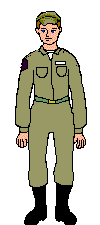Misc
LEADERSHIP QUALITIES CAN BE STRUCTURED INTO 3 MAIN AREAS....
Leadership qualities can be structured into 3 main areas: 'approach to people', 'approach to task', and 'individual orientation'. The figure below highlights this model of officers leadership structure. Each circle represents an important aspect of military officers' roles and some of the PQs that are relevant to each of those aspects. Of course, many of the PQs can be related to more than one area; this model is just a guide.
It would be an understandable misconception if all military officers were expected and required to be genuine leaders. Whilst true leadership, for some officers, is a paramount pre-requisite, in other officers, raw leadership skills are much less important. As the roles of the officer vary enormously, so does the preferred list of qualities required by the individual.
However, the closer the officer is to the battle, with the consequent, greater risk to life, then the more dynamic and decisive the leader will need to be. Even in times of war, the rear echelons and the support staff, because of their comparatively, risk-free existence, will not usually need quite the abundance of raw qualities required by the warrior under fire. It follows therefore that, when identifying officer potential during the selection process, due regard should be given to the individual's planned future employment as an officer. The quality requirements for instance for the potential platoon commander, fighter pilot or submariner will probably be different to those pre-requisite qualities for the engineer or logistician. Whilst the differing roles of an officer will usually require a different emphasis on qualities most, if not all NATO officer selection systems can aim to identify generic potential only. Later, professional training will then identify and develop the specific qualities to type. The word potential is significant. A selection system, by its very nature, has to have a programme which, at best, runs for just a few days. Whilst some true qualities in a candidate may possibly emerge and be identified during the selection process, an effective assessment system has to be geared to look more for potential in a candidate than inherent attributes.


